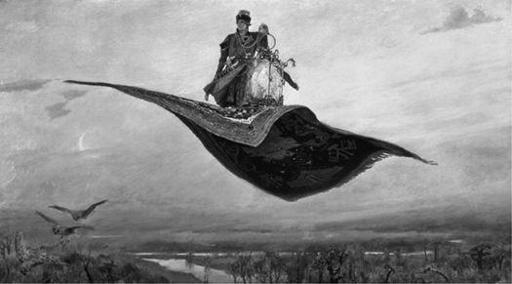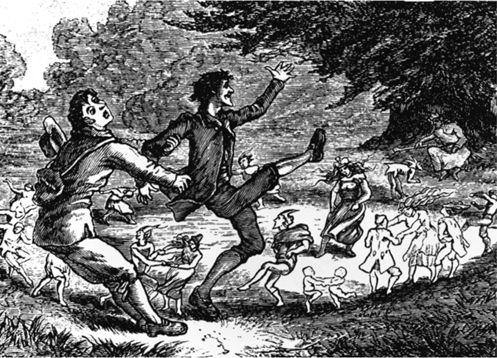The Sorcerer's Companion: A Guide to the Magical World of Harry Potter (30 page)
Read The Sorcerer's Companion: A Guide to the Magical World of Harry Potter Online
Authors: Allan Zola Kronzek,Elizabeth Kronzek

It’s long been said that fairies leave evidence of their nightly revelry. According to British folklore, when fairies dance under the stars, in the morning the spot will be marked by a circle of bright green or matted-down grass known as a “fairy ring.” A wish made while standing in the center of a fairy ring under a full moon is guaranteed to come true.
But beware of stepping into a fairy ring while the fairies are still celebrating! Any human who does so will be compelled to dance to the point of exhaustion. The only means of escape is to be rescued by a friend, who, keeping one foot firmly on the outside of the ring, reaches in and pulls the captive out.
Mysterious rings of discolored grass really do exist across Europe and North America, often appearing after heavy rains. They can range in diameter from a few inches to as much as two hundred feet. However, scientists insist that they’re caused by a class of fungi known as
Basidomycetes
, and not by fairies after all.
(
photo credit 24.3
)

 luffy, the room-size, three-headed dog who guards the Sorcerer’s Stone at Hogwarts, has a mythological heritage dating back almost three thousand years. His most venerable ancestor is Cerberus, the savage hound of Greek and Roman legend who guards the entrance to the underworld. In the eighth century
luffy, the room-size, three-headed dog who guards the Sorcerer’s Stone at Hogwarts, has a mythological heritage dating back almost three thousand years. His most venerable ancestor is Cerberus, the savage hound of Greek and Roman legend who guards the entrance to the underworld. In the eighth century
B.C.
, the poet Hesiod described Cerberus as having fifty heads and a voice of brass. Just two centuries later, however, fifty heads apparently seemed excessive even for a vicious guard dog. In what became the standard image of the beast, artists depicted Cerberus with a mere three heads, a dragon’s tail, and a backbone that bristled with serpents.

The ancient Greeks believed that when someone died, his or her spirit went to the world below. Ruled by the god Hades and his wife Persephone, this “underworld” was the destination of all souls, good or bad, but the quality of their lives there depended on how they had behaved on Earth. As the watchdog of the underworld, Cerberus’ job was to make sure no one escaped the kingdom of Hades after passing through the gates. Born of two terrible monsters (see
Chimera
), Cerberus had little trouble frightening people. If the sheer sight of him was not enough, the sharp teeth of three wild dogs’ heads and the spikes in his tail could be used quite effectively.
Only a few mythological characters managed to elude Cerberus and make the journey back to the land of the living. The nymph Psyche managed to sneak past by feeding the dog a drugged honey cake, and the Trojan war hero Aeneas followed her example. The musician Orpheus, who ventured into the underworld in search of his dead wife, Eurydice, played his lyre so beautifully that Cerberus closed his eyes in ecstasy and allowed him to pass. (Fluffy reacts to music in much the same way.) And Heracles, completing the last of his twelve labors, wrestled Cerberus with his bare hands, managing to drag the beast back up to Earth for a brief time.
Legend holds that during his days in the world of the living, Cerberus drooled, as dogs will. A few drops of his saliva fell on the earth, from which sprang a poisonous plant called aconite. Also known as wolfsbane, aconite is a real plant that was commonly used in the
potions
and ointments of both fictional and real
witches
.


 lying carpets may be outlawed by the Ministry of Magic, but that hasn’t kept these wondrous tapestries out of the hands of some of the Middle East’s most powerful
lying carpets may be outlawed by the Ministry of Magic, but that hasn’t kept these wondrous tapestries out of the hands of some of the Middle East’s most powerful
wizards
and
magicians
.
The earliest stories about magic carpets appear in connection with King Solomon. The son of David (of David and Goliath fame) and Bathsheba, Solomon is traditionally regarded as ancient Israel’s greatest ruler. According to the Old Testament’s Book of Kings, he was both a skilled politician and a ferocious warrior. With his mighty armies, he carved out an empire that stretched all the way from Egypt to the Euphrates River in Iraq. An unusually wise and just king, he cherished beauty, wrote exquisite poetry, and built spectacular temples and palaces.
Solomon’s achievements were so impressive that, after his death, many ancient Jewish and Islamic writers came to believe he was a powerful magician. The Muslim holy book, The Koran, claims that Solomon could “speak the tongue of birds” and command the actions of angels and genies (known as
jinn
), and “was endowed with all good things.” Later Arabic storytellers expanded on this tradition, giving the Israelite king a magic ring and
cauldron
, the power to control the wind, and a magnificent flying carpet that would carry him wherever he desired.

Descriptions of Solomon’s flying carpet vary greatly from story to story, but most writers agree that it was made of fine green silk and was very, very large—perhaps as wide as sixty miles across. According to the nineteenth-century explorer and scholar Richard Burton, “its length and breadth were such that all the Wise King’s host could stand upon it, the men to the left and Jinns to the right of the throne.” Once Solomon’s army was comfortably settled on the rug, “the Wind at royal command, raised it and wafted it whither the Prophet [Solomon] would, while an army of birds flying overhead canopied the host from the sun.”
Solomon’s miraculous carpet was clearly the inspiration for the later, more modest flying tapestries found in many Arabic folk tales, such as “The Story of Prince Ahmed and the Fairy Paribanou.” In this popular Persian fable from
The Arabian Nights
, a young prince named Houssain accidentally stumbles across an amazing “piece of tapestry” that can transport its owner anywhere in the world. With this carpet Houssain is able to save the life of his beloved princess, instantly delivering a magical apple to her bedside when he learns that she lies dying hundreds of miles away.
